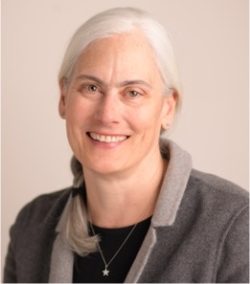
Five global science and technology projects were selected to join the Ocean Biogeochemistry Virtual Institute (OBVI), part of Schmidt Sciences, to address gaps in ocean data and modeling by improving the breadth of research in the field and expanding capacity to understand ocean resources. Anitra Ingalls, professor in the UW College of the Environment School of Oceanography, is among the awardees and will lead one of the projects.
“I was thrilled to learn that our team would be a part of OBVI,” said Ingalls. “This program is an incredible opportunity to work across disciplines with a team of scientists from all over the world to better understand how the ocean stores carbon.”
Schmidt Sciences, started by Eric and Wendy Schmidt, will bring together 60 scientists from 11 countries to provide research into how much carbon dioxide the ocean can hold and the resilience of marine ecosystems in a rapidly warming world.
Ingalls’s project — titled Animals as Living Bioreactors: The role of animal gut microbiomes in shaping oceanic carbon cycling and export — will examine how the ocean may be processing carbon in an unexpected place: ocean animal guts. The team will work with scientists in Madagascar and Brazil to better understand how sea creature digestive tracts work as tiny bioreactors that facilitate carbon flux in the ocean, with potential global implications.
“Marine animals, like other animals, host communities of gut microbes that have a profound effect on animal health and expand the metabolisms occurring in the animal in ways that enhance the nutritional value of their food,” said Ingalls. “Our team aims to understand how this microbial “digestion” within the guts of fish is influencing the amount of carbon that is stored in the ocean by breaking down organic matter, producing fertilizer for phytoplankton communities, and enhancing the sinking of carbon into the deep ocean. We hypothesize that gut microbiomes of midwater animals substantially expand the functional role that animals play in the ocean’s carbon cycle.”

OBVI, through a joint call for proposals with Schmidt Ocean Institute, selected five awardees to make up a global research network and receive financial support from Schmidt Sciences. Teams will have access to Schmidt Ocean Institute’s Falkor (too), a state-of-the-art 110-meter global-class research vessel. They will also receive expert shipboard assistance to tackle the challenges associated with collecting large amounts of biological, chemical, geological and physical oceanography data. Through this research, the teams will develop accurate modeling across ocean systems to address ocean processes in climate projections and mitigation.
“The ocean plays a powerful role in regulating Earth’s climate and acts as a vast repository for carbon and heat. Studies to date reveal that the ocean has absorbed and stored nearly one-third of the carbon dioxide that humans have emitted over the last century,” said Lexa Skrivanek, OBVI program lead at Schmidt Sciences. “The question of whether it can continue to do so at the same rate is one of the most critical ones we face today. Scientists have developed a broad understanding of how the ocean shapes climate, but we lack a deeper knowledge of the processes that govern carbon cycling and storage in the ocean, connections between carbon and other elemental cycles, and the roles that marine microbes and animals play in shaping those relationships.”
Collaborators on the Bioreactors team include:
Anela Choy, Scripps Institution of Oceanography, UC San Diego, US
Hilary Close, University of Miami, US
Aina Le Don, Institute Halieutique et des Sciences Marines, Madagascar
Colleen Durkin, Monterey Bay Aquarium Research Institute, US
Peter Girguis, Harvard University, US
Naomi Levine, University of Southern California, US
Delano Schleder, Instituto Federal Catarinense – Araquari campus, Brazil
Tracey Sutton, Nova Southeastern University, US

